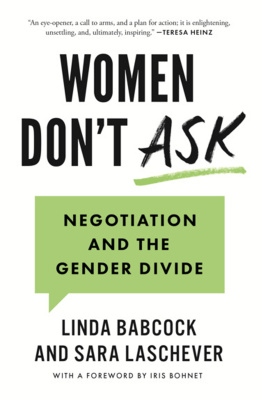Linda Babcock - Ask For It: How Women Can Use Negotiation to Get What They Really Want
Here you can read online Linda Babcock - Ask For It: How Women Can Use Negotiation to Get What They Really Want full text of the book (entire story) in english for free. Download pdf and epub, get meaning, cover and reviews about this ebook. year: 2008, publisher: Random House Publishing Group, genre: Romance novel. Description of the work, (preface) as well as reviews are available. Best literature library LitArk.com created for fans of good reading and offers a wide selection of genres:
Romance novel
Science fiction
Adventure
Detective
Science
History
Home and family
Prose
Art
Politics
Computer
Non-fiction
Religion
Business
Children
Humor
Choose a favorite category and find really read worthwhile books. Enjoy immersion in the world of imagination, feel the emotions of the characters or learn something new for yourself, make an fascinating discovery.
- Book:Ask For It: How Women Can Use Negotiation to Get What They Really Want
- Author:
- Publisher:Random House Publishing Group
- Genre:
- Year:2008
- Rating:3 / 5
- Favourites:Add to favourites
- Your mark:
- 60
- 1
- 2
- 3
- 4
- 5
Ask For It: How Women Can Use Negotiation to Get What They Really Want: summary, description and annotation
We offer to read an annotation, description, summary or preface (depends on what the author of the book "Ask For It: How Women Can Use Negotiation to Get What They Really Want" wrote himself). If you haven't found the necessary information about the book — write in the comments, we will try to find it.
Ask For It: How Women Can Use Negotiation to Get What They Really Want — read online for free the complete book (whole text) full work
Below is the text of the book, divided by pages. System saving the place of the last page read, allows you to conveniently read the book "Ask For It: How Women Can Use Negotiation to Get What They Really Want" online for free, without having to search again every time where you left off. Put a bookmark, and you can go to the page where you finished reading at any time.
Font size:
Interval:
Bookmark:

CONTENTS
PHASE ONE
Everything Is Negotiable
PHASE TWO
Lay the Groundwork
PHASE THREE
Get Ready
PHASE FOUR
Put It All Together
Linda dedicates this book to her mom,
for her support, guidance, and encouragement

Sara dedicates it to her husband Tim:
unvarying source of inspiration, lively debate, and loving support

W HY Y OU N EED TO A SK
I F YOURE A WOMAN, you probably have a voice inside your head that whispers:
Are you sure youre as good as you think you are?
Or maybe it says:
Why cant you be happy with what youve got? Dont you have enough already?
Or perhaps, even though youre very successful, you hear that voice warning:
Watch out. Dont get pushy.
This voice probably talks the loudest when youre thinking about asking for something you wanta raise, a better title, more power or responsibility, or even more help around the house. And the odds are, you listen to this voice. You may think its the voice of experience, or maybe your common sense preventing you from doing something rash. Or perhaps you think you should be grateful for what youve gotyou should feel luckyand not mess things up by reaching for more.
Weve written this book to help you talk back to that voice. Because that voice is not the voice of experience and its not your common sense. Its not even your voice. Its the voice of a society that hasnt progressed nearly as far as wed like to think, a society thats still trying to tell women how they should and shouldnt behave. Its a voice whose message is conveyed, often unwittingly, by our parents, teachers, colleagues, and friendsand then repeated and amplified by the media and popular culture.
If you have that voice in your head, whoevers voice it is, that voice is holding you back. Its slowing you down, its damaging your self-esteem, and its costing you money. By telling you not to ask for the things you want, that voice is cutting you off from dozensmaybe hundredsof opportunities to improve your life and increase your happiness. Its also preventing you from learning how to negotiate for what you need with skill and confidence. Its preventing you from discovering the ways in which negotiating effectively can be an extraordinary tool for transforming your life.
W OMEN D ONT A SK
We know that this is truethat women dont ask for what they want and need, and suffer severe consequences as a resultbecause weve spent years studying the phenomenon. In the mid-1990s, Linda was serving as the director of the Ph.D. program at the Heinz School, the graduate school of public policy and management at Carnegie Mellon University, where she teaches. One day a group of female graduate students came to her office. Why are most of the male students in the program teaching their own courses this fall, the women asked, while all the female graduate students have been assigned to act as teaching assistants to regular faculty? Not knowing the answer, Linda took the students question to the associate dean in charge of making teaching assignments, who happened to be her husband. His reply was straightforward. Ill try to find teaching opportunities for any student who approaches me with a good idea for a course, the ability to teach, and a reasonable offer about what it will cost, he said. More men ask. The women just dont ask.
Could he be right? Linda recalled other situations in which a female student had protested because a male student had enjoyed some form of special treatment. One woman told Linda that she assumed she couldnt march in June graduation ceremonies the year she completed her dissertation because she wasnt scheduled to get her degree until August. She asked why Linda had allowed two men to march who also didnt finish until the end of the summer. Another woman asked why Linda had found funding for a male student to attend an important public policy conference and hadnt provided the same opportunity to her. A third woman observed a male student using department facilities to print up business stationery for himself and said she thought it was unfair that other students werent allowed to do the same. In each case, the men had asked, and Linda, who saw it as a central part of her job to help students in any way she could, happily obliged.
Linda realized with chagrin that shed been perpetuating discriminationthe last thing she wanted to dosimply by not noticing how much more often men asked for things that would help them get ahead. And the discrimination shed perpetuated could have far-reaching consequences. Men with teaching experience would have meatier rsums and appear better qualified when they entered the job market than women who did not. The man who attended the public policy conference made valuable contacts that could be useful later in his career, and the woman who couldnt afford to go had missed out. The man who printed up his own stationery was able to present himself as a more polished and professional job candidate than the women who had not.
The social scientist in Linda perked up. Shed spent ten years teaching negotiation to students, salespeople, business executives, scientists, physicians, lawyers, and womens leadership groups. Did this difference in the rate of asking between her male and female students indicate that women werent using negotiation to promote their careers as much as they could be? Was this a problem that contributed to the unequal treatment of women throughout their adult lives?
Linda turned to the existing research about gender differences in negotiation to find out. What she discovered surprised her: This large body of research looked almost exclusively at how men and women behave when theyre negotiating. No one had taken a step back to look at what motivates people to negotiate in the first place, andmore significantlywhether men and women use negotiation to advance their goals at the same rate.
Eager to learn more, Linda and several colleagues launched a research program to explore these questions. She and her collaborators invited men and women into their research lab, asked them to play carefully designed games, and observed whether they used negotiation to improve their positions. They sent graduate students armed with questionnaires to airports and shopping malls. They designed experiments that explored the emotions people associate with negotiation. They created a huge Web survey to poll people of every age and economic group, from the lowest-skilled to the highest-paid professionals, about their attitudes toward negotiation. This survey asked participants about how and when they used negotiation and about the types of situations in which they felt they could negotiate. The bottom line: In every study, Lindas team found clear and consistent evidence that men initiate negotiations to advance their own interests about four times as frequently as women do.
T HE C OSTS OF N OT A SKING
Does this difference matter? Does the relative infrequency with which women assert what they want actually cost women, and if so, what are the costs? Since the wage differential between men and women still hovers around 77 percentmeaning women on average earn only 77 cents for every dollar earned by a manLinda decided to look first at salaries. What she found shocked her: Not negotiating their salaries, it turns out, can be outrageously expensive for women. Here are a few examples of how costly it can be.
Next pageFont size:
Interval:
Bookmark:
Similar books «Ask For It: How Women Can Use Negotiation to Get What They Really Want»
Look at similar books to Ask For It: How Women Can Use Negotiation to Get What They Really Want. We have selected literature similar in name and meaning in the hope of providing readers with more options to find new, interesting, not yet read works.
Discussion, reviews of the book Ask For It: How Women Can Use Negotiation to Get What They Really Want and just readers' own opinions. Leave your comments, write what you think about the work, its meaning or the main characters. Specify what exactly you liked and what you didn't like, and why you think so.











